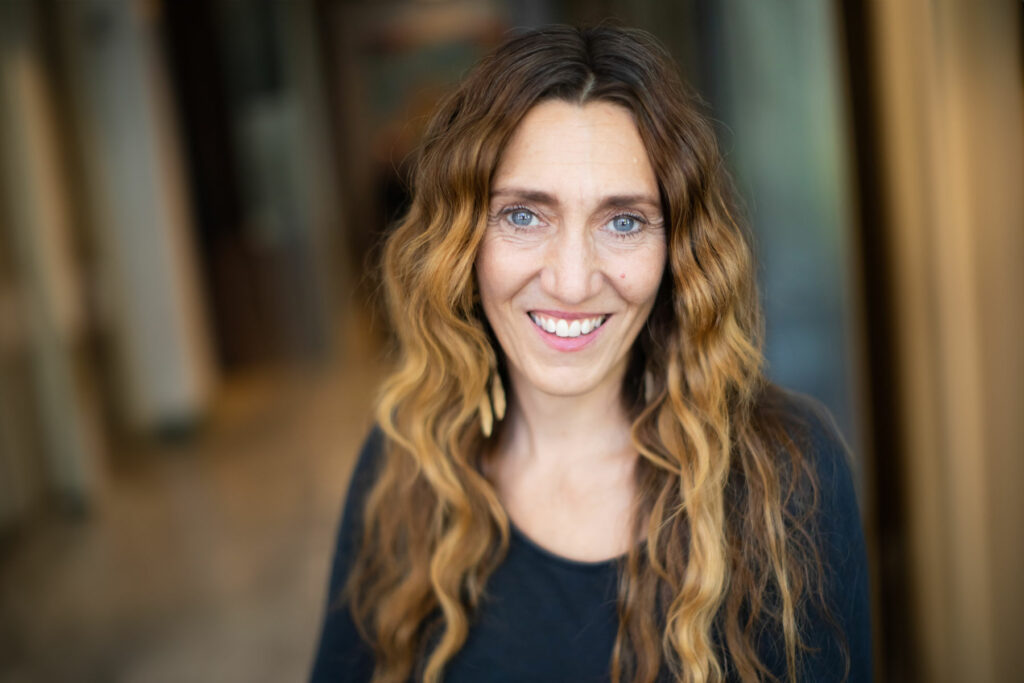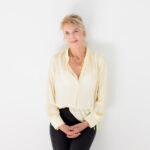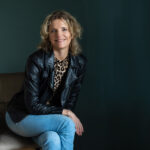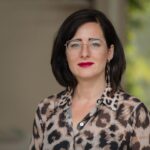“You never stop parenting a child, even if he dies. I am still parenting, which has to do with everything I do in my day, with everyone I meet, and the integrity in my movements. Gabe is still held by what I am living.”
Deborah savran (USA)
Growing up, Deborah Savran of the United States was not expected to become a doctor. Her mother told her many times that she could do whatever she wanted with her life, but the one non-negotiable was, “Make sure you have children.” Looking back, she feels that her mother struggled with not fitting in and feeling lesser than other people.
How was it for your mother?
While she was growing up, my mom had felt like she was a second-class citizen. She worked hard to free herself from this. She married my dad, who came from a very well-known family. He owned a famous bookstore in Minneapolis. After marrying him she felt she had made it, and part of that was having a child. That was also expected by the family. She had two children: me and four years later my sister.
Was it only your mother who reflected to you that having children is important in life?
There is a strong consciousness about how a woman should be. Traditionally, you get married and have children. I think that my mom was certainly not alone in being caught up in that consciousness, that a child gives you purpose and that your worth depends on your fertility. As a mother, you are the matriarch of the family and are in charge of the home and the children. This is a widespread picture, without question.
Did your mother step into that role of matriarch?
My mom was not a very domestic person. She was not into being a home maker and domestic like a traditional ‘matriarch of the family’, but she was also not absent – she was home with us, but her focus was more on exposing us to music and art and culture, rather than teaching us to cook and clean. She wanted her children to be cultured. We went to the ballet and concerts. She would read to us, and we would go to all these wild events, like performance art ‘happenings’, dance parties, political marches.
My parents were hippies, so not the traditional parents, with lots of cooking and tucking us into bed every night. There was a different vibe in our family; more funky and cool.
Deborah got married when she was 24 and did not think about having children straight away. She and her husband travelled the world and lived in different places. Something changed though when she turned 28.
I remember having a strong feeling that we needed to start thinking about having children. We tried for a year, and then I got pregnant but ended up having a miscarriage after six weeks. I went to the hospital and the doctors were very rough with me. Not necessarily physically rough, but rough in how they were speaking to me. The doctor came in and said, “Lady, lady, you have more than a pregnancy in there. You have a large growth on your uterus, but it’s not necessarily cancer.” I was like – “What?” and almost fainted. It turned out that I had fibroids, which are one of the biggest causes of infertility.
How did you deal with this?
I basically went into a year and a half of ill health and a kind of hypochondria. It was interesting, because I never actually thought that I had cancer in the uterus, but I thought I had everything else. At the time I was studying for my degree in naturopathic medicine in Australia. I would be like, “Oh, maybe I have this or that” – basically, everything I was learning in school. I had some weird symptoms, and I lost a lot of weight. I had lymph nodes coming up in my neck. But the main thing that kept me busy, was the idea that I might not be able to have children. I spent this year and a half trying to feel well again and trying to do all these naturopathic things, taking herbs and acupuncture, to shrink these fibroids.
I was desperate, so I did everything you could possibly think of to make sure I would become a mother. I desperately wanted a baby.
How was your health before you got pregnant? Did you have any symptoms?
Up until that day, when I ended up in the hospital, I felt really great. I was super excited and joyful that I was pregnant. I remember swimming in the sea with my then husband. The water was warm; it was summer. Everything felt great. From the moment that the doctor told me about the fibroids, I went into this spiral down state of unhealthiness and desperation that I might not be able to have children. Close friends were starting to have kids, and I didn’t want to miss out on being part of the ‘mom club.’ That was the main reason why I wanted to get better.
One day, about a year and a half later, Deborah was in the shower and got this strong sense that she needed to have surgery, something she had been resisting since her first visit to the hospital. She went into surgery, five fibroids were removed and after one year, she got pregnant again.
What was it like for you to be pregnant? Did you have any expectations or pictures about what it would be like having a child?
Definitely. I was living in this part of Australia where everybody was into having a home water birth while looking out over the ocean. And you definitely had to breastfeed your child until they were about seven years old. Just kidding, but it was all about attachment parenting, where your children sleep in the bed with you. I am not saying any of these things are right or wrong, but I was living in this kind of a hippie consciousness and most of my friends who had kids were modeling this way of parenting to me. I was all on board for that and thought, “I’m going to have a water birth at home and have a midwife.” During my pregnancy with my son Gabe, I found out that I couldn’t have this kind of midwifing home birth due to scars on my uterus. I had a difficult time accepting that, because I held this very strong picture of how I wanted it to be, even before having the surgery. It left me feeling that I was not going to be as full of a woman as I could be. There was this idea that a real woman gives birth vaginally, where she pushes the baby out. A cesarean section was almost like a taboo word.
There is a strong picture around the globe, that as women we should give birth the natural way, among many other pictures around pregnancy and giving birth.
Yes, there is. This was around 2000. Now I feel, that with all the social media it is even worse, in how strong the pictures are in how you have to be pregnant, how you have to give birth and all these ideals of how it should be. It all looks hunky-dory and great. It is almost like you are failing as a woman when you have a cesarean section. Yes, you are a mother, but not as great of a mother compared to the lady next to you who gives birth the natural way.
What was it like for you when your son Gabe was born?
It was so incredibly beautiful when Gabe was born. When I saw him and they placed him on my chest, I will never ever forget the purity of him. And I felt the responsibility of taking care for this child. I was in heaven, taking care of this precious little being and being so tender with him. For a long time, I did not want anybody else to hold him because I could feel people’s needs and energies that would come with it. Gabe was stunning, so beautiful, with big eyes and blonde hair and just so much energy and light. Even when he was in my tummy, he was very active. When I was really pregnant, people would be like, “Oh my God, your whole belly just moved.”
Did you feel more complete after your had Gabe?
I felt like I did it; I have a baby. Now I am a mother. I felt like, I guess, how my mom felt.
I remember when I was pregnant with Gabe and I had a little bit of bleeding, I got really scared. Oh, no, not again! I was at the University, and I had a group of really close friends. I came out sobbing to them saying,
“Oh, my God, I can’t have another miscarriage. If I don’t have children, my life will have no meaning.”
So yeah, when Gabe was born, I felt like okay; this is it, my life now has meaning. He became my everything. I didn’t work for a year. He was my main focus.
Gabe died at the age of 17. Have you ever sensed that he would die young?
I actually knew that Gabe would die, maybe four years before he actually did. He started to have some mental health struggles. He came to me when he was around 13 and told me that he was having suicidal thoughts. I saw him struggling, on and off. Towards the end of his life, it was more consistently. He also suffered from anxiety. I was taking him to doctors and therapists and tried to get him support. I would frequently come home, walk into the house and be like: “Oh my god, is Gabe dead?” I would search through the house to make sure he was okay.
I observed him struggling and, toward the end of his life, he felt like a train out of control, like a train wreck. You watch it going on and think: “What can I do? What can I do to stop this train from crashing?” And there is nothing you can do. You try to support your child – for years. I spoke to my own practitioners about it a lot. I had to respect what he was open to and what he was not. If it had been me going through what he was going through, I would have been open to different things than he was actually open to. Gabe was more open to taking medication or seeing doctors and regular therapists. I don’t know how much he actually opened up to his therapist. He started smoking pot, which was interesting. When he was little, he would always say, “Drinking, smoking, and taking drugs is so stupid, man. I am never going to do that.” But then his friends started smoking pot, so I would talk to him about it. It’s interesting to talk about this now, because it brings back the actual sense I had, which was confusion, desperation, and powerlessness. Nothing that I was doing helped him to shift the anxiety, and so the self-medication that he was doing because of it, continued. The professionals that were working with him couldn’t help him either.
When I heard that he had died, the first thing I said was: “I knew it.” My friend that was with me said: “Don’t say that.” I said: “No, I knew it.”
It has been four years. What have you learned and realized about life, death, motherhood and yourself?
I feel very, very close to Gabe. I feel almost closer to him now than I did when he was alive. This has nothing to do with thinking about him, or about the way he looked. It has nothing to do with him as a person; it is something much bigger than that. It has to do with his true essence. I feel that he is an inspiration for me because I continue to parent him in the sense of how I am in my day. The responsibility that I felt when Gabe was born and was placed on my chest, is one million times bigger now. I am still parenting, which has to do with everything I do in my day, with everyone I meet, and my integrity in my movements. You never stop parenting a child, even if he dies. Gabe is still held by what I am living and will continue to be held by that when he incarnates into his next life.
How I live now has deepened so much since Gabe was a baby. I have grown and developed a lot during his life. Where I have come to these days, is such a much greater depth of sacredness and absoluteness and being free of so many of those consciousnesses that I was held by. Even though the ‘train crashed’, I know that he was offered love and truth. He could not fully say yes to it, but it was offered.
It is commonly said that losing a child is the worst thing that can happen to somebody. Gabe’s death was definitely the worst and hardest thing that has happened in my life, but also offered a huge blessing and opportunity. It is a weird thing to say this as his mother, but Gabe’s death offered an opportunity for great healing. Not just for him and where he’s going to now but also for me, his group of friends and for many people. His death had a huge ripple effect of love, and still has.
I used to say to Gabe, when he was little: “Gabe, be a truth bringer.” I feel his death was like him being that truth bringer. I mean, look at the state of the world. How many kids are dealing with anxiety and are taking drugs? All of his friends stopped taking hard drugs when Gabe died. They not only stopped taking drugs, but they cleaned up their act and woke up to the magic that was taking place. Many people contact me asking me to speak to them about how I moved so gracefully through Gabe’s passing over. “How do you do that?” they ask.
My mother had said: “Whatever you do, have children.” I am now completely free of that. I know you have interviewed women who do not have biological children. I do not see myself as any different from them at all. I do not feel like my life is greater because I had children and raised them. My daughter is off doing her own thing. I don’t have a life where I have my family and we get together every weekend for family dinners and go on holidays together. That is a strong ideal about how life should look like, and this ideal was strongly fed to me as well. I have no need to have that.
I have waves of missing Gabe and moments of grief, but I am not carrying any burden.
Not long after Gabe died, I wrote a song called, “There is no death. There is no separation.” It is impossible for me to ever be separated from Gabe or from anybody. In the song I say we need not fear death because we are so held and cared for. It is important to do the human grieving, and I certainly did masses of grieving. But behind the veil there is something completely different going on. I could feel Gabe, after he died, being held in some space, without any pain. It felt like a golden highway of light, and when I felt that, I wouldn’t miss him. Some people say that when you pass over you will see people you know. I will never see Gabe again in the form that he was in this life. That part is definitely gone. But I don’t need to, because my connection with him now goes beyond the one-life story of Deborah and Gabe, to something grander.
In what way has your life changed, from having a family to where you are now?
I went through a second divorce. We were not legally married, but we had been together for a long time. It was a huge breakup. I lost my relationship with my stepchildren who I was raising as if they were my own kids. So that felt like losing another three kids. But you can’t take me down.
You can do the worst possible things to me and take away everything in my life, my home, my child, my relationships, my car, but it does not feel as if something has been taken away.
There is nothing anymore that can offset what I am here to do. I am now loving living on my own, working a ton, recording music for my next album, writing a book about death, grief, and loss, and enjoying being social with my huge community of loved ones here in Seattle and around the world. Everyone I meet is like family to me. That is how I live now.
When you know somebody so intimately, like I knew Gabe, you see how incredibly beautiful their Soul is — their heart and the essence of them — and you are just madly in love with that person. And we could be that with any single person on the planet, right? Each of us has certain people who we get to practice that with and have more expression of that love with. Obviously, Gabe was one of those people in this life for me. The purpose of it is to feel that potential with every single person we meet.
Gabe is physically gone now, but through connecting to him, it activates the love for everyone in me. I have become more open and unlimited in how I can love the stranger on the street or the cashier at the store. The limitations and boundaries of who we can love and who we can treat like our family, or our most precious only son, have disappeared. I’m sure that I could have gotten to that place without having to lose a child, but losing Gabe has absolutely supported me, combined with the knowing that there is no death. Gabe is part of what we are all a part of. So instead of seeing somebody who kind of looks like Gabe, or has a similar energy to him, and being like, “Oh, I miss Gabe.” I am like: “There’s that quality, it’s still right here, moving around the world.” Instead of thinking that I am missing out, I see that the qualities that Gabe was, and still is, are in so many people. I am enjoying that by being as open as I possibly can, to see that and respond to and engage with it, instead of to what we have been sold, that as a parent you will be grieving for the rest of your life, and you will always carry this burden. Why not go for the golden opportunity instead, to burst open your heart to everybody?
Why did you make a cover of the song ‘The Woman I am?’
That song goes beyond being a mother, or not. I even think a lot of men like to listen to that song. This song is for everybody in celebration of our beauty. I am now a woman who takes care of herself. When I had babies, and even before that, I was not appreciating myself and not tending to my own preciousness and the deep inner beauty. I sing this song because I want as many women as possible to hear this song. It is written by a man, who adores, loves, and confirms women. The song is so powerful, and it activates something in every woman who listens to it. It allows you to step into celebrating your beauty, regardless of any roles, pictures or whatever is going on, even if you have lost a child. Nothing can touch that beauty.
What would you say today to young people?
Just be you in whatever you do.
Was that a challenge for Gabe, being himself in life?
Yes, it was. He had a challenge being himself in life. I remember speaking to one of Gabe’s best friends after he died. He said Gabe was too bright and beautiful to fit into the box that society wanted him to fit into. And that is true. Gabe was so much joy and so bright and for many people he was too much. When he was little, he was so joyful, and he knew what brotherhood was. He just loved people and when he saw somebody from school, he would walk to them and say: “Oh my god, I love you.” He did not say that in words, but all of his movements showed how much he loved people. At some point, he started to dim that down, instead of settling with it. That is when he started to have anxiety and eventually started taking drugs, because he would get the feedback that he was too much; from school and certain peers, who wanted Gabe to be cool. He was the friend who would give hugs. He got trapped in the box of how he needed to behave, and a heaviness came in. He was not designed to live with heaviness, but to live with joy and as a truth bringer. He would regularly call out things that were not true. Gabe was really a remarkable being.
What was it like for you to talk about Gabe for this interview?
Hard… and beautiful. Even though I feel him all the time, I don’t talk about Gabe that much anymore. It feels beautiful because it brought some things to the surface to feel, release and let go of. But it also felt very confirming. When you asked how it has been in the last four years, but also about the time I wanted to get pregnant, and where I am at now, so much has changed.
I come from being a desperate woman who wanted a child, to a woman who is free of that consciousness and is present — when the call is there — to bring the nurturing qualities of mothering, without bounds, to everyone.
✺









Sooooooooo deeply beautiful to read. Thank you.
What an awesome reflection on living life, loving all and not trying to hold onto someone, death and letting go.